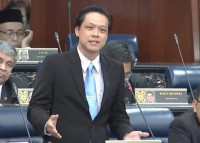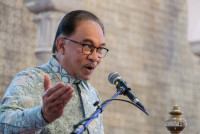A HOT topic in the WhatsApp groups I am in is how to build a more resilient and united nation.
Perhaps, the key and most vexing obstacle to this national mission, as identified by friends from the upper echelons of professions in the public and private sectors, and representing a good cross-section of our multiracial society, is the New Economic Policy (NEP) and its legacy in the continuation of race-based approaches, strategies and policies.
In these WhatsApp conversations – one of which runs into several hundred messages a day, just to give an idea of the apprehension over the country’s future prospects – there is no etiquette or rule book to guide the group chat. Hence, the discussion on the NEP has been relatively frank and uninhibited.
Often, sharp observations, insightful opinions and helpful suggestions that are politically incorrect are posted.
Unfortunately whatever analysis takes place is fleeting, cavalier or momentary. Also apparent in curtailing the NEP discussion is the concern about being too frank, or texting what may be seen as negative or hurtful remarks that can weaken the multiracial group’s cohesion and relationships.
Drawing on these conversations, what is provided here is a way forward on how to break free from the NEP impasse and policy prison that Malaysians are trapped in.
It is shared with readers in the hope that players can cast aside their inhibitions and fears, and contribute ideas on how to deconstruct and dismantle a policy that has been the main centripetal and disunifying force in the nation.
Plucking the fruits of NEP success
The approach is to identify the economic and social sectors in which the Malay community has achieved parity or superiority in relation to the position of other ethnic communities.
There is irrefutable evidence of not just Malay success, but also of overwhelming Malay dominance in many spheres of the economy and society.
In these spheres, race-neutral, merit-based or other non-ethnicity-related criteria can be substituted to become the main or sole policy determinant.
Ethnicity-based allocations of reasonable proportion can be continued, but only after full disclosure and justification of the need.
This targeting of the low-hanging fruits of the NEP’s successes is overdue for at least four reasons.
1. The very large Malay elite and middle class, who are the creation of NEP policies, are more than able to compete on an equal footing with other communities. They do not need further special assistance.
2. The continuation of NEP policies whose targets have been achieved is a breach of Article 153 of the constitution, which calls for the protection of the legitimate interests of other communities, notwithstanding the special position of the Malays.
3. The extension and expansion of the initial NEP policy into all areas of socio-economic life constitute an unjust and unjustifiable deviation from the original policy.
It impinges on the substance and spirit of Article 153, and the basic concept of equality and equal protection of the law as contained in Article 8(1), which prohibits discrimination against a person or class of persons, unless there is a rational basis for such discrimination.
4. The prolonging of the policy breeds mediocrity, is socially divisive, and has a regressive economic impact.
So, what are the possible areas for the liberalisation and dismantling of the NEP’s race-related provisions?
Here is a short list to which others may wish to supplement:
– Public and private sector housing discounts and quotas;
– Public university staffing positions; student admission quotas and other ethnic preference measures; national educational system as reflected in Budget allocations; special education institutions; scholarship awards; Mara ethnic preference policies; Civil service intake; senior positions and promotions licences; and, tenders and contracts to government-linked companies and other special-purpose government agencies.
Hopefully, suggestions can be forthcoming from stakeholders, such as GLCs, manufacturers, small and medium enterprises, housing developers and other business groups, as well as various sectors of the civil service that have borne the brunt of the burden in implementing ethnic preference requirements and conditions for doing business or in the nation’s governance.
Dealing with opposition to NEP’s dismantling
Obviously, objection to dismantling NEP benefits can be expected from Malay politicians, policymakers from the civil service, and other elite and middle-class Malays who have been the principal beneficiaries.
It is an undeniable fact that their children and grandchildren will continue to monopolise the gains from ethnic preference.
Besides the usual Malay groups, we have also seen support for ethnic preference policies from a few non-Malay academics, who justify the status quo in Ketuanan Melayu policies for reasons relating to their personal advancement.
The response to ethnocentric and opportunistic opposition should not be silence, collaboration, resignation or impotence.
It should be the calm presentation of fact-based feedback, and data on the indisputable impact and outcomes from citizens, businesses, the media and other stakeholders.
What is needed for policy change and reform calls for perseverance and stamina in knocking the closed doors of policymakers and the bureaucracy.
Otherwise, we will be really stuck with what cynics have termed a “Never Ending Policy”.
Quite apart from the legal, moral and other arguments against the continuation of ethnic preference, the reality is that the NEP is the main stumbling block to a revitalised Malaysia.
The sooner it is replaced by a race-neutral, needs-based, merit-oriented and region-specific (prioritisation of Sabah and Sarawak’s legitimate rights) policy framework, the quicker the nation can become resilient and united, and have a dynamic economy. – The Vibes, November 9, 2020
Lim Teck Ghee is an independent policy analyst whose latest book is titled ‘Challenging Malaysia's Status Quo’




















